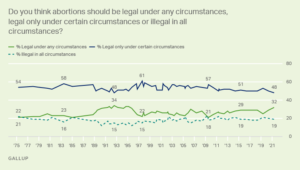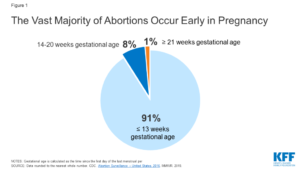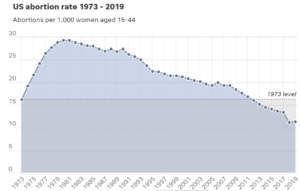
One of the biggest misconceptions about Roe v. Wade is that it ushered in an era of deeply divided, hyper-polarized opinions about abortion rights. Though an advocate for reproductive freedom, future Justice Ruth Bader Ginsburg famously called the landmark decision a "heavy-handed judicial intervention [that] was difficult to justify," a ruling that "appears to have provoked, not resolved, conflict."
But that's just not true.
Regardless of heated and occasionally violent opposition from radical pro-lifers, for most Americans, Roe led to a half-century of remarkably stable cultural consensus about how to balance the rights of women with the rights of fetuses or, as pro-lifers prefer, unborn children.
 Attitudes toward abortion have stayed constant since Roe was decided, with just 19 percent of Americans agreeing that it should be banned in all circumstances, two percentage points lower than in 1975 when Gallup started asking the question. Eighty percent agree it should be legal in all or some circumstances, which is four percentage points higher than in 1975. That consistency is all the more remarkable when you realize that when Roe was decided, 30 states banned abortion completely and only 20 allowed it under some circumstances.
Attitudes toward abortion have stayed constant since Roe was decided, with just 19 percent of Americans agreeing that it should be banned in all circumstances, two percentage points lower than in 1975 when Gallup started asking the question. Eighty percent agree it should be legal in all or some circumstances, which is four percentage points higher than in 1975. That consistency is all the more remarkable when you realize that when Roe was decided, 30 states banned abortion completely and only 20 allowed it under some circumstances.
Roe held that the state could "could regulate (but not outlaw) abortions in the interests of the mother's health" in the second trimester of pregnancy and ban abortions only in the third trimester of pregnancy as a fetus developed more "potentiality of human life." Its successor case, Planned Parenthood v. Casey, affirmed a right to an abortion until a fetus became viable outside the womb.
Unlike slavery and civil rights, abortion is not an issue that lends itself to absolute moral clarity. There are obviously two sets of rights involved, but exactly when legal personhood for the fetus begins has always been contested, as seen in historic laws that banned abortion only after "quickening."
The cultural genius of Roe is that it created broad parameters that reflect how we think about pregnancy and abortion: At some point during gestation, the fetus becomes a person with a right to life and liberty, but drawing that line will always be a compromise and imprecise. Honest brokers on both sides of the abortion debate will acknowledge that the opposing side has a case.
 Survey data show that Roe was remarkably effective at balancing the rights of the fetus and the mother in a way that fits with our societal values. Sixty percent of Americans support abortion in the first three months of pregnancy and only 13 percent in the final three months. Even more telling is data showing that 93 percent of abortions are performed before the 13th week of pregnancy, and just 1 percent are done after 21 weeks.
Survey data show that Roe was remarkably effective at balancing the rights of the fetus and the mother in a way that fits with our societal values. Sixty percent of Americans support abortion in the first three months of pregnancy and only 13 percent in the final three months. Even more telling is data showing that 93 percent of abortions are performed before the 13th week of pregnancy, and just 1 percent are done after 21 weeks.
Abortion policy is about creating a workable, pragmatic compromise that allows people to live their lives on their own terms and peaceably argue for their point of view. Ending Roe risks allowing states to outlaw abortion altogether—13 states have "trigger laws" that will automatically ban abortion if the decision is overturned—or to try and ban out-of-state travel for women seeking the procedure.
But individual freedom trumps federalism. Though abortion will never be a clear-cut issue, once we have broad societal agreement on how to delineate between the interests of the mother and the interests of the fetus, women across the country deserve basic protections for their bodily autonomy and privacy.
 Keeping abortion legal for at least part of pregnancy doesn't mean that pro-lifers won't be able to reduce its incidence. The abortion rate has declined for decades despite the procedure's availability. So has the unwanted pregnancy rate. These are outcomes worth celebrating, as they reflect women being in more control of their own bodies.
Keeping abortion legal for at least part of pregnancy doesn't mean that pro-lifers won't be able to reduce its incidence. The abortion rate has declined for decades despite the procedure's availability. So has the unwanted pregnancy rate. These are outcomes worth celebrating, as they reflect women being in more control of their own bodies.
Overthrowing Roe and Casey would threaten that progress and broad consensus by stoking a new culture war in which states rush to ideological extremes that run roughshod over the rights of women or fetuses, depending on the state, some of which are already trying to restrict access to their residents' ability to receive or even fund abortions performed elsewhere.
Post-Roe America would be one with fewer rights and, likely, more political division. There's no perfect policy on abortion, but in 1973, the court struck a compromise that most Americans continue to endorse. That victory, I fear, is about to be undone.
Photo Credits: Lorie Shaull from St Paul, United States, CC BY-SA 2.0, via Wikimedia Commons; Ron Sachs/ZUMAPRESS/Newscom; Ms. magazine, CC BY-SA 4.0, via Wikimedia Commons; Keiko Hiromi/Polaris/Newscom.
Music Credits: "Rebreather," by J-A-V-A via Artlist.
Written and narrated by Nick Gillespie. Edited by Regan Taylor.
The post In Defense of <i>Roe</i> appeared first on Reason.com.







